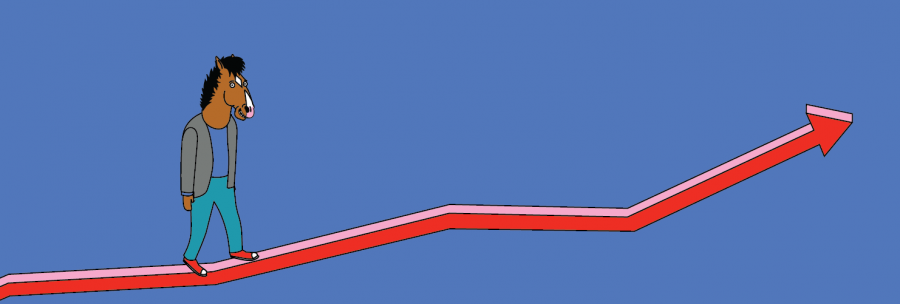Opinion | ‘Bojack Horseman’ avoids traditional Hollywood tropes
November 4, 2019
After observing the fan outrage provoked by the “Game of Thrones” final season, fans are being reminded the beloved TV show faces the same hindrances that befall most popular shows.
These include the need to appease a growing fanbase; the need to please the network; the struggle to resolve the character arcs and conclude the show in an appropriate way and the mountainous endeavor of maintaining the unique and drawing aspects that made the TV show popular in the first place.
Shows drag on too long. They have nothing to say beyond a point, and yet, they continue. They often become unable to overcome traditional Hollywood cliches. Higher-up executives use the popularity to intervene more and administer the show in a direction more profitable at the expense of quality. With some exceptions such as “Breaking Bad” or “Friends,” almost every show envelops the infamous quote from “The Dark Knight”: “You either die a hero or you live long enough to see yourself become the villain.”
One show that satirizes these Hollywood cliches as well as the toxic nature of its culture is Netflix’s original series, “Bojack Horseman.” It has something to say, and it says it well. Its characters are well-rounded, and its genre strikes a strong balance between a comedy animal show and a dark, yet insightful, drama.
Its sixth and final season contains two parts — the first released on Oct. 25, and the final part will release on Jan. 31.
Get The Daily Illini in your inbox!
For a show to prove its eminence, it not only has to avoid the typical Hollywood Death Arc, it also has to be unique, profound, genuine and inviting. “Bojack Horseman,” through its multi-layered storytelling, grippingly achieves all of these attributes, while also making one laugh at its derision.
“Bojack Horseman” takes place in a burlesque version of Hollywood named “Hollywoo,” where humans coexist with anthropomorphic humanoids. Its premise seems frightening at first, but it makes it so much more relieving to cut the tension of a deep, philosophical conversation with an animal gag, such as a giraffe with several neck pillows or a hammerhead shark using its head to hammer in a nail.
The show revolves around the titular character, Bojack, a horse, and an aged, forgotten B-list celebrity who previously starred in his hit 90s sitcom “Horsin’ Around.” He struggles with debilitating alcoholism and self-destructive behavior in his quest to discover true fulfillment. The show frequents politics, cultural issues, superficiality and themes of legacy.
It is often known for its hilarious one-line quips and thought-provoking monologues, as well as its fourth-wall breaks that ridicule the TV industry as well as its own creators on occasion.
It features characters like Todd, a zany couch-sleeper who stumbles into absurd, idiosyncratic adventures, which function as lighthearted counterweights to the gravitas of the show but also offer more than just comic-relief. It also features characters like Diane, a Vietnamese-American writer and outspoken feminist, who drive the message home in a manner that feels bona fide and human.
Although the show’s first few episodes are admittedly lackluster, “Bojack Horseman” boasts the rare talent of consistently improving its already-impressive quality every season. Much of the show revolves around a caricature of Hollywood and its blind greed that often ruins shows; therefore, there is no reason to expect “Bojack Horseman” will not culminate in a satisfying conclusion.
The show’s humor doesn’t appear in one sole form — it diversifies. The shows running gags include frequent callbacks to previous episodes, random bouts of alliteration, animal gags, a badass Margo Martindale and a mixture of high-brow wit and low-brow absurdity. Oftentimes the show will also hide jokes in the background of scenes — on signs, news headlines, posters or book covers — that make viewers feel accomplished for catching them as they pass.
The show’s amazing cast of voice actors requires mentioning. Will Arnett, Aaron Paul, Amy Sedaris, Alison Brie and Paul Tompkins, through their voice-acting, demonstrate a deep familiarity with the characters they portray.
Each character, while given a distinct personality, is given air-time to show their complex array of emotions and desires. But this three-dimensional nature of the characters is only possible because of the show’s fantastic cast working tirelessly.
“Bojack Horseman” is a severely underrated television show that Netflix does not advertise nearly well enough. It makes a bold attempt to fuse disparate genres, and it manages to stick the landing every time. It appeals to audiences of all different senses of humor and tastes in television. The show is well-worth your time, and you would be remiss in giving it a pass.
Andrew is a sophomore in LAS.







